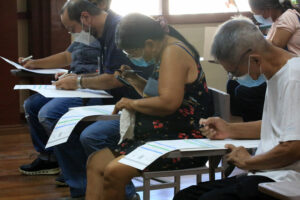
Midterm polls, Marcos and Duterte rift cost Filipinos key reforms, analysts say
By Kenneth Christiane L. Basilio, Reporter
KEY POLICY reforms in education, health, and labor among other sectors have been “disregarded” as focus shifted to the 2025 midterm elections and the widening rift between two of the country’s most influential political families, analysts said.
Political observers noted that incumbent politicians this year were more concerned with securing reelection and the deepening political feud between President Ferdinand R. Marcos, Jr. and Vice-President Sara Z. Duterte-Carpio instead of the policy agenda.
“Many opportunities for reform and lasting changes were disregarded as they focused more on controlling people through excessive allocations that are translated as favors to some and dole-outs to ordinary people,” Arjan P. Aguirre, who teaches political science at the Ateneo de Manila University, said in a Facebook Messenger chat.
Mr. Aguirre said that Filipinos and policymakers alike were “distracted” by the Marcos-Duterte strife this year, resulting in key policies for the “education, health, labor, and energy sectors” taking a backseat.
“We have yet to see long-term and systemic reforms and changes that would really lead to economic growth and development,” he said.
“Most government initiatives and programs, such as Ayuda Para sa Kapos ang Kita Program and other forms of cash assistance given by local government units, are inherently dole-outs,” he added. “Billions of pesos are lost every fiscal year because of this kind of spending that is still endemic in our political institutions and government bureaucracy.”
This year can be described as “an aggravation of oligarchic politics and nationalization of clientelism,” Anthony Lawrence A. Borja, an associate political science professor at De La Salle University, said in a Facebook chat.
Meanwhile, Dennis C. Coronacion, who chairs the University of Sto. Tomas Political Science Department, said that this year’s political events were shaped by a few elites with a stake in the developments.
“Our political landscape has always been dominated by political dynasties. Thus, our political events in 2024 have been shaped and dictated by their interests,” he said in a Facebook chat.
PIVOTAL YEARNext year could be a pivotal period for the government of Mr. Marcos as Filipinos are set to elect half of the influential 24-seat Senate, and a new set of party-list and district representatives.
“The Marcos Jr. administration could make 2025 a pivotal year if it could crowd out the Dutertes and reinforce its hold on the presidential bandwagon,” Hansley A. Juliano, who teaches political science at the Ateneo, said in a Facebook chat.
Incumbent presidents risk losing their political clout during midterm elections as voters get a chance to shape the composition of both chambers of Congress, which is currently in favor of Mr. Marcos.
“The midterm elections are always a validation and an assessment of the incumbent administration,” Edmund S. Tayao, president of Political Economic Elemental Researchers and Strategists, said in a Viber message.
The Marcos administration would need to show “strength” in the months leading up to the election to bolster its perception to Filipino voters, Maria Ela L. Atienza, a political science professor at the University of the Philippines, said in a Viber message.
“The administration has to show its strength as well as provide some level of satisfaction as far as people’s perspectives are concerned. It should not simply rely on patronage and ayuda (aid),” she said. “There is growing discontent on the part of people even in surveys.”
Despite a dip in trust ratings for the country’s top officials in the latter half of 2024, a Social Weather Survey revealed that 54% of respondents still trust Mr. Marcos as president, while 52% of Filipinos trust Ms. Duterte.
The voting preferences of Filipinos won’t likely be affected by issues that hounded 2024, such as the controversial 2025 national budget and the feud between the Marcoses and Dutertes, according to Mr. Borja.
“Unless these issues are pinned on specific candidates or end up into severe crises that can affect a person’s everyday life, then I don’t think it would have much impact on voting preference,” he said.
But it remains likely that Filipino voters would choose candidates offering dole-outs, Mr. Juliano said. “The public remains hostage to clientelism and ‘bring home the bacon politics’ in their voting choices.”
While there could be political shifts after the midterm elections, its outcome remains bleak as political dynasties continue to dominate the ballots, according to Mr. Tayao.
“There may be change but for the worse.”
